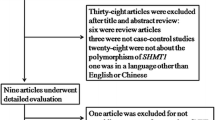Abstract
Background
Low folate intake and changes in folate metabolism due to polymorphisms in the methylentetrahydrofolate reductase (MTHFR) gene have been associated with myelomagenesis. However, controversial data have been published regarding a protective role of variant alleles of MTHFR on MM.
Patients and methods
To investigate the influence of two common polymorphisms of MTHFR C677T and A1298C on the risk of multiple myeloma (MM), we performed a matched case-control study. The methylation status pattern of p16 was also addressed.
Results
The frequency each of 677 CC, 677CT, and 677TT was 31, 44, and 25%, respectively, whereas, the frequency each of 1298 AA, AC, CC was 48, 44, and 8% in MM patients. In the control group, the frequency each of 677CC, 677CT, and 677TT was 36, 45, and 19%, respectively, while the frequency each of 1298 AA, AC, CC was 37, 50, and 13%, respectively. No significant association between susceptibility to MM, 677, and 1298 MTHFR variants was detected. As regards p16 methylation, we confirmed a high prevalence of p16 methylation (40%) in patients affected by MM and demonstrated that MTHFR 677CC is associated with a higher prevalence of p16 hypermethylation.
Conclusions
Our data demonstrated that variant alleles did not play a key role neither in protection nor in increased risk for MM, suggesting that the effect of MTHFR on folate metabolism might be modified by diet intake. Moreover, our findings demonstrated that p16 hypermethylation might be a frequent genetic aberration in MM and may contribute with other molecular aberrations in the pathogenesis of this malignant disorder.
Similar content being viewed by others
References
Ueland PM, Hustad S, Schneede J et al (2001) Biological and clinical implications of the MTHFR C677T polymorphism. Trends Pharmacol Sci 22:195–201
Schwahn B, Rozen R (2001) Polymorphisms in the methylenetetrahydrofolate reductase: clinical consequences. Am J Pharmacogenomics 1:189–201
De Stefano V, Chiusolo P, Paciaroni K et al (1998) Prevalence of the 677C to T mutation in the methylenetetrahydrofolate reductase gene in Italian patients with venous thrombotic disease. Thromb Haemost 79:686–687
Papa A, de Stefano V, Danese S et al (2001) Hyperhomocisteinemia and prevalence of polymorphisms of homocisteine metabolism-related enzymes in patients with inflammatory bowel disease. Am J Gastroenterol 96:2677–2682
Skibola CF, Smith MT, Kane E et al (1999) Polymorphisms in the methylenetetrahydrofolate reductase gene are associated with susceptibility to acute leukemia in adults. Proc Natl Acad Sci USA 96:12810–12815
Chiusolo P, Reddiconto G, Cimino G et al (1999) Methylenetetrahydrofolate reductase genotypes do not play a role in acute lymphoblastic leukemia pathogenesis in the Italian population. Haematologica 89:139–144
Gemmati D, Ongaro A, Scapoli GL et al (2004) Common gene polymorphisms in the metabolic folate and methylation pathway and the risk of acute lymphoblastic leukemia and non-Hodgkin’s lymphoma in adults. Cancer Epidem Biomar 13:787–794
Galm O, Wilop S, Reichelt J et al (2004) DNA methylation changes in multiple myeloma. Leukemia 18:1687–1692
Frosst P, Blom HJ, Milos R et al (1995) A candidate genetic risk factor for vascular disease: a common mutation in methylenetetrahydrofolate reductase. Nat Genet 10:111–113
Weisberg I, Tran P, Christensen B et al (1998) A second genetic polymorphism in methylenetetrahydrofolate reductase (MTHFR) associated with decreased enzyme activity. Mol Genet Metab 64:169–172
Toyota M, Kopecky J, Toyota MO et al (2001) Methylation profiling in acute myeloid leukemia. Blood 97:2823–2829
Gonzalez Ordonez AJ, Fernandez Carreira JM, Fernandez Alvarez CR et al (2000) Normal frequencies of the C677T genotypes on the methylenetetrahydrofolate reductase (MTHFR) gene among lymphoproliferative disorders but not in multiple myeloma. Leuk Lymphoma 39:607–612
Gonzales-Fraile MI, Garcia-Sanz R, Mateos MV et al (2002) Methylentetrahydrofolate reductase genotype does not play a role in multiple myeloma pathogenesis. Br J Haematol 117:890–892
Yanamandra K, Bocchini JA, Thurmon TF (2003) Methylenetetrahydrofolate reductase CC normal genotype may protect against multiple myeloma. Br J Haematol 120:1089–1090
Lincz LF, Scorgie FE, Kerridge I et al (2003) Methionine synthase genetic polymorphism MS A2756G alters susceptibility to follicular but not diffuse large B-cell non-Hodgkin’s lymphoma or multiple myeloma. Br J Haematol 120:1051–1054
Ng MH, Chung YF, Lo KW et al (1997) Frequent hypermethylation of p16 and p15 genes in multiple myeloma. Blood 89:2500–2506
Tasaka T, Asou H, Munker R et al (1998) Methylation of the p16INK4a gene in multiple myeloma. Br J Haematol 101:558–564
Gonzalez M, Mateos MV, Garcia-Sanz R et al (2000) De novo methylation of tumor suppressor gene p16/INK4a is a frequent finding in multiple myeloma patients at diagnosis. Leukemia 14:183–187
Guillerm G, Gyan E, Wolowiec D et al (2001) p16 INK4a and p15 INK4b gene methylations in plasma cells from monoclonal gammopathy of undetermined significance. Blood 98:244–246
Kramer A, Schultheis B, Bergmann J et al (2002) Alterations of the cyclin D1/pRb/p16(INK4a) pathway in multiple myeloma. Leukemia 16:1844–1851
Mateos MV, Garcia-Sanz R, Lopez-Perez R et al (2002) Methylation is an inactivating mechanism of the p16 gene in multiple myeloma associated with high plasma cell proliferation and short survival. Br J Haematol 118:1034–1040
Mateos MV, Garcia-Sanz R, Lopez-Perez R et al (2001) p16/INK4a gene inactivation by hypermethylation is associated with aggressive variants of monoclonal gammopathies. Hematol J 2:146–149
Guillerm G, Depil S, Wolowiec D, Quesnel B (2003) Different prognostic values of p15INK4b and p16INK4a gene methylation in multiple myeloma. Haematologica 88:476–478
Seidi S, Ackermann J, Kaufmann H et al (2004) DNA methylation analysis identifies the E-Cadherin gene as a potential marker of disease progression inpatients with monoclonal gammopathies. Cancer 100:2598–2606
Acknowledgements
We thank Dr. Francesco Bartolozzi for the statistical analysis. This work was supported in part by Associazione Italiana per la Ricerca sul Cancro (AIRC).
Author information
Authors and Affiliations
Corresponding author
Rights and permissions
About this article
Cite this article
Chiusolo, P., Farina, G., Putzulu, R. et al. Analysis of MTHFR polymorphisms and P16 methylation and their correlation with clinical–biological features of multiple myeloma. Ann Hematol 85, 474–477 (2006). https://doi.org/10.1007/s00277-006-0097-1
Received:
Accepted:
Published:
Issue Date:
DOI: https://doi.org/10.1007/s00277-006-0097-1




